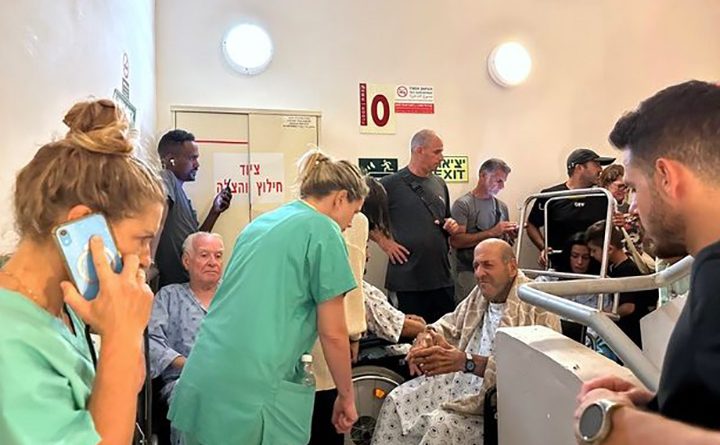Reporter’s notebook: Hamas causes worst nightmare in Israel’s history
Twenty-one days have now gone by since Hamas terrorists launched their massive, horrific assault against Israel, changing my adopted country—and the Middle East—perhaps forever.
What made this attack even more shocking was the beautiful calm that had prevailed over Tel Aviv the night before. That evening, Oct. 6, was the first time I had walked the entire length of a scenic new pedestrian boardwalk along the Mediterranean north of the city, to a beachside picnic spot where my large Israeli extended family had gathered to celebrate a birthday party.
It was a Friday night, and as I leisurely strolled north, I passed Israeli youth smoking joints under a makeshift tent, as well as Arab families sitting on blankets and gathered around their traditional hookah pipes. Exactly 50 years to the day had passed since the 1973 Yom Kippur War, when Israel—caught off guard on the holiest day in the Jewish calendar—was attacked by the armies of Egypt and Syria, leading to one of the bloodiest conflicts in Israeli history.
Nobody could imagine that lovely night that we’d ever be caught by surprise again. But we were.
The next morning, at precisely 6:34 a.m., my wife and I were awakened by the ear-splitting sound of air-raid sirens. Throwing on clothes and grabbing our phones, we quickly ran to the stairwell of our apartment building, where all our neighbors had also gathered.
It had been well over two years since the last such siren, during the Gaza mini-war of May 2021. I was sure this was some kind of a technical glitch, especially after looking at the tzeva adom or “red alert” app and seeing hundreds of little red dots—each of which represented an incoming rocket— completely covering central Israel. Adding to my suspicions, neither of us had received a text alert warning us of what was about to happen.
We quickly realized, however, that this was no mistake. The huge explosions caused by our Iron Dome taking down incoming projectiles shook our old building, frightening babies and causing everyone’s dogs to howl with fear.
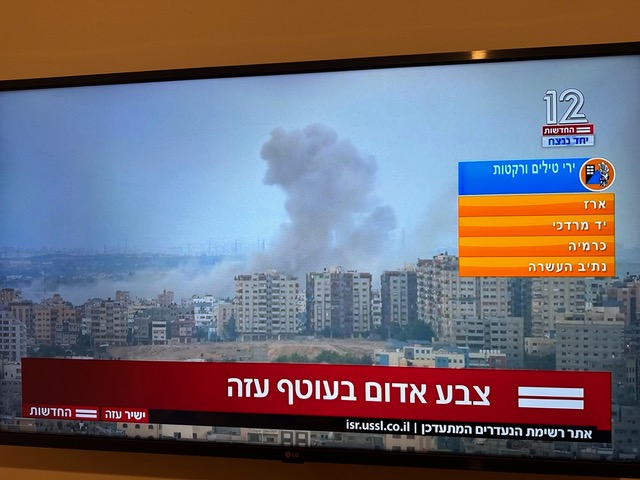
It was only after getting the all-clear, going back inside, and turning on the TV did we learn that Hamas had launched hundreds of rockets at Israeli targets. Yet that turned out to be a cover. The real tragedy unfolded in the ensuing hours, as the confirmed death count rose from 22, to more than 100, to 700, and ultimately to an unthinkable 1,400 Israelis—most of them young men and women in the prime of their lives—along with babies, kids and even elderly Holocaust survivors.
In addition, 4,229 Israelis have been injured, 26 of them critically. It quickly emerged that Hamas terrorists (sorry, I cannot bring myself to call them “militants”) armed with machine guns, knives, and grenades had somehow penetrated Israel’s highly fortified border with Gaza and overrun half a dozen nearby kibbutzim. Horrific battles erupted in the streets of Sderot, with terrorists shooting at cars and invading private homes, in many cases executing entire families as they cowered in closets and safe rooms.
Using GoPros and iPhones, the terrorists documented their own rampage, which tragically included the murder of 260 Israelis at an all-night nature festival celebrating love and peace.
The comparisons to Yom Kippur quickly became irrelevant. This was also not Israel’s 9/11, but a much worse tragedy—ultimately going down in history as the single bloodiest day for Jews anywhere since the Holocaust itself.
Still in shock, we heard that the hospitals had issued an urgent appeal for blood. We walked along Tel Aviv’s suddenly deserted streets to Sourasky Medical Center—one of the city’s largest hospitals—and there discovered hundreds of Israelis already lined up to donate blood. Type O was urgently in need, but by the time we arrived, so many people had donated that they no longer needed further donations, and we were told to come back tomorrow.
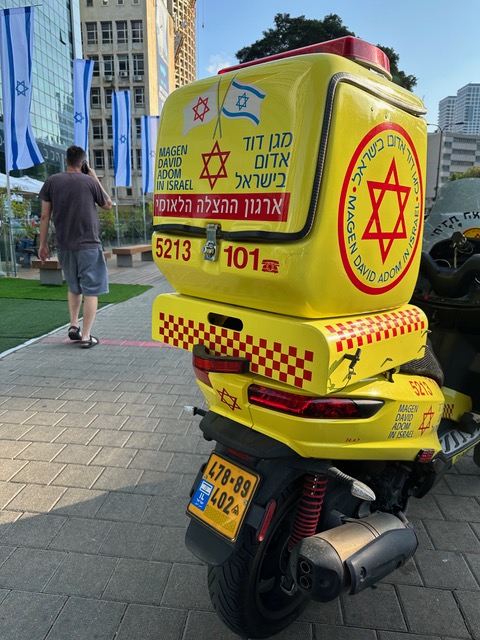
Early on Day 2 of the war, I returned to the hospital, walking along streets that were even more empty than the previous day. Upon my arrival, the sirens went off again, and hundreds of us were herded into an underground shelter. This happened several more times. On my way home, a third air-raid alert sounded, and for the first time, I was outside, on the street, with nowhere to hide. I ducked into a nearby building and followed its residents to an underground shelter, and stayed there until it was safe to come out.
This pattern has repeated itself virtually every day since the war began. Today, Hamas rockets targeted both Tel Aviv and Jerusalem, forcing members of Israel’s Knesset to take refuge in shelters. At the same time, the Israel Defense Forces has launched a massive air campaign against Hamas, dropping some 6,000 bombs on Gaza and flattening hundreds of buildings. A ground assault is due to begin imminently; by press time, some 5,700 Palestinians in Gaza have been killed in Israeli airstrikes, with untold thousands more injured.
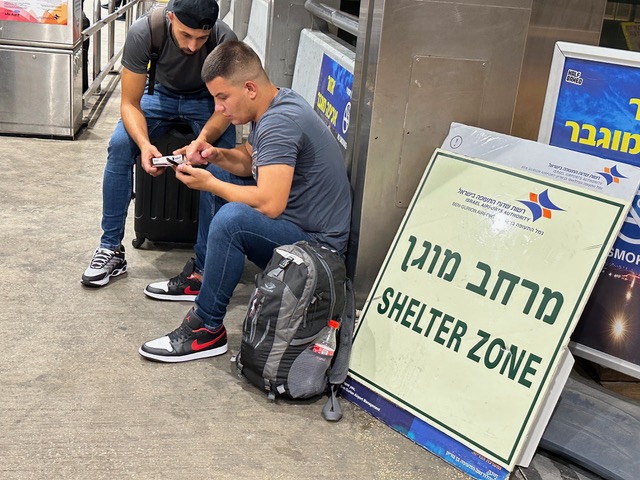
Through it all, I’ve received hundreds of text messages, WhatsApp chats, and Facebook posts from friends and well-wishers in many countries, including those at war—or close to war—with each other: Russia and Ukraine; Kosovo and Serbia; Armenia, and Azerbaijan. Half a dozen former ambassadors to the US have expressed concern for my safety and that of my family, not to mention friends in several Muslim countries from Bangladesh to the United Arab Emirates.
I’ve also been barraged with videos from both Israeli sympathizers and Israel’s enemies. Their claims often cannot be verified, yet one video stands out in particular: an interview with senior Hamas official Ali Baraka in Arabic, in which he admits that Hamas had been planning the operation since mid-2021.
“In the past couple of years, Hamas has adopted a ‘rational’ approach. It did not go into any war, and did not join the Islamic Jihad in its recent battle,” he said. “We made the Israelis think that Hamas was busy with governing Gaza, and that it wanted to focus on the 2.5 million Palestinians [in Gaza], and has abandoned the resistance altogether.”
Baraka added: “The Israelis are known to love life. We, on the other hand, sacrifice ourselves. We consider our dead to be martyrs. The thing any Palestinian desires the most is to be martyred for the sake of Allah, defending his land.”
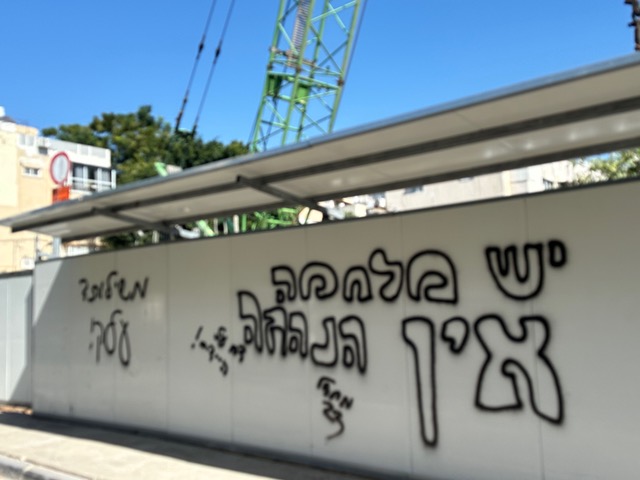
There are credible reports of Israeli doctors—including Arab ones—being used by Hamas as human shields.
At the diplomatic level, there appears to be little hope of a ceasefire, let alone an end to the hostilities. The IDF, which has dubbed the war “Swords of Iron,” wants to “wipe Hamas off the face of the earth,” while President Biden—visited Israel on Oct. 18—warned Israel in no uncertain terms that “it would be a mistake for Israel to occupy Gaza again.”
Michael Herzog, Israel’s ambassador to the US insisted during an appearance on CNN’s State of the Union program with Jake Tapper that his country is following international law as it prepares to root out Hamas forever.
“We have no desire to occupy or reoccupy Gaza,” said Herzog, who’s also the brother of Israeli President Isaac Herzog. “We have no desire to rule over the lives of over two million Palestinians. And, certainly, we want people to go back to their homes. We’re talking about innocent civilians. And we are doing everything we can to keep them out of harm’s way, while Hamas is doing everything it can to keep them in harm’s way. That’s the situation we are at.”
Herzog added: “I think talking about the day after is a bit premature because crushing the Hamas war machine will require time. The questions you raise are valid, and I think we will have to enter discussions with our partners, with the international community
The United Nations Human Rights Council says it has evidence of war crimes committed by both sides.
“Intentional targeting of civilians and civilian objects without a military necessary reason to do so is a war crime, period,” David Crane, an American international law expert and the founding chief prosecutor of the UN Special Court for Sierra Leone, told AP. “And that’s a standard that both sides are held to under international law.”
In addition, Human Rights Watch has accused Israel of using white phosphorus against civilians in both Gaza and southern Lebanon. HRW claimed it had verified videos taken in Lebanon on Oct. 10 and Gaza on Oct. 11 showing “multiple airbursts of artillery-fired white phosphorus over the Gaza City port and two rural locations along the Israel-Lebanon border.” The IDF has called such allegations “unequivocally false.”
The Palestine Liberation Organization no longer has an office in Washington. Yet Husam Zomlot, who last held that position and is now posted to London, refused to condemn the Hamas attack against Israel when asked by the BBC if he would do so. Instead, he told the interviewer that this was neither “the right question” nor an “important” one.
“Hamas is a militant group. You are talking to a Palestinian representative, and our policy is very clear. This is not about support or not support [of Hamas]. I am here to represent the Palestinian people and what they are going through. I am not here to condemn anybody. And if anybody needs to be condemned, it’s what you call ‘the only democracy in the Middle East’—and that is Israel.”
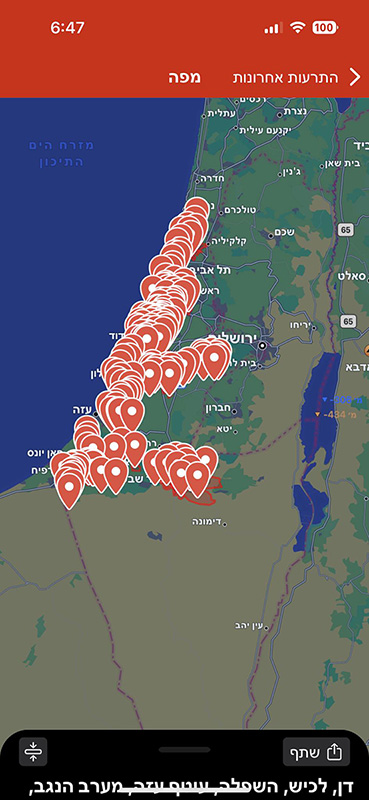
How this will end is anybody’s guess. Will Hezbollah join in the fight against Israel, opening up a new front in this quickly escalating war and drawing in its main backer, Iran? Indications certainly point that way. Will Israel go forward with its ground invasion of Gaza, with its potentially enormous loss of life? If so, can it ever really eliminate Hamas as a threat? Will Russia join the fight? Is World War III imminent?
For now, I am safely in Albania, having decided to leave Israel on Oct. 15—and enduring two rocket attacks while waiting for my flight and having to run to an evacuation shelter.
President Biden and First Lady Jill Biden said in their statement that “this horrific act of hate by Hamas has no place in America, and stands against our fundamental values: freedom from fear for how we pray, what we believe, and who we are.”
Just a few days ago, Jordanian King Abdullah II warned of a dire situation in the Middle East if the conflict between Israel and Hamas is allowed to spread.
“The whole region is on the brink of falling into the abyss,” he said after meeting German Chancellor Olaf Scholz in Berlin.
It seems nobody is safe anywhere anymore.

Larry Luxner is news editor of The Washington Diplomat and former editor of CubaNews. Born and raised in Miami and based in Bethesda, Md., since 1995, Larry has reported from every country in the Western Hemisphere. His specialty is Latin America and the Middle East, and he’s written more than 2,000 articles for publications ranging from National Journal to Saudi Aramco World. Larry also runs an Internet-based stock photo agency at www.luxner.com.

